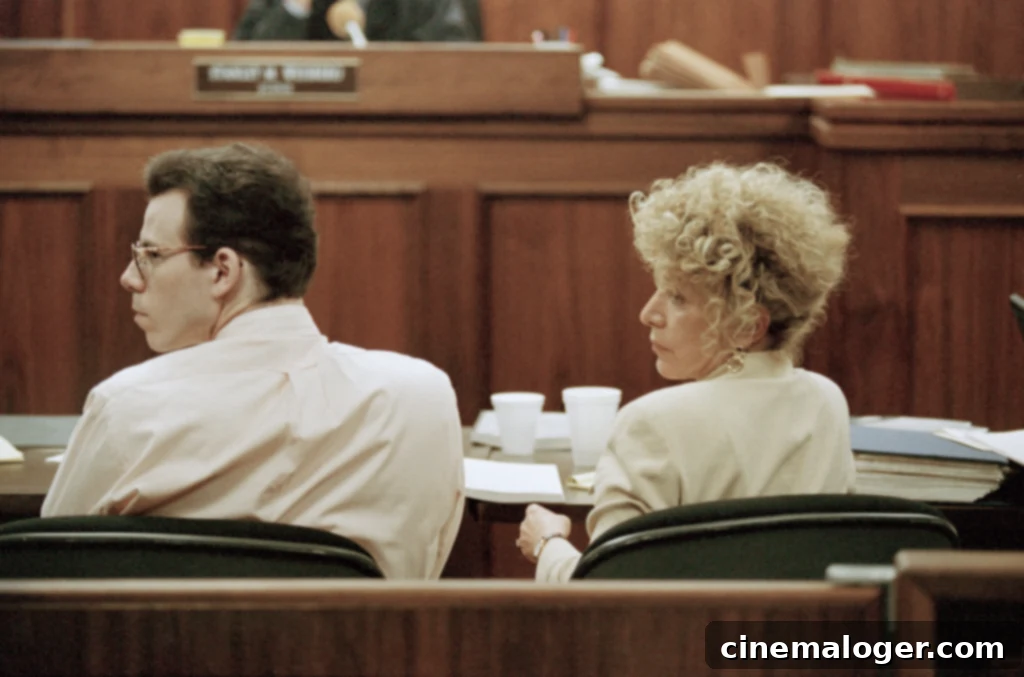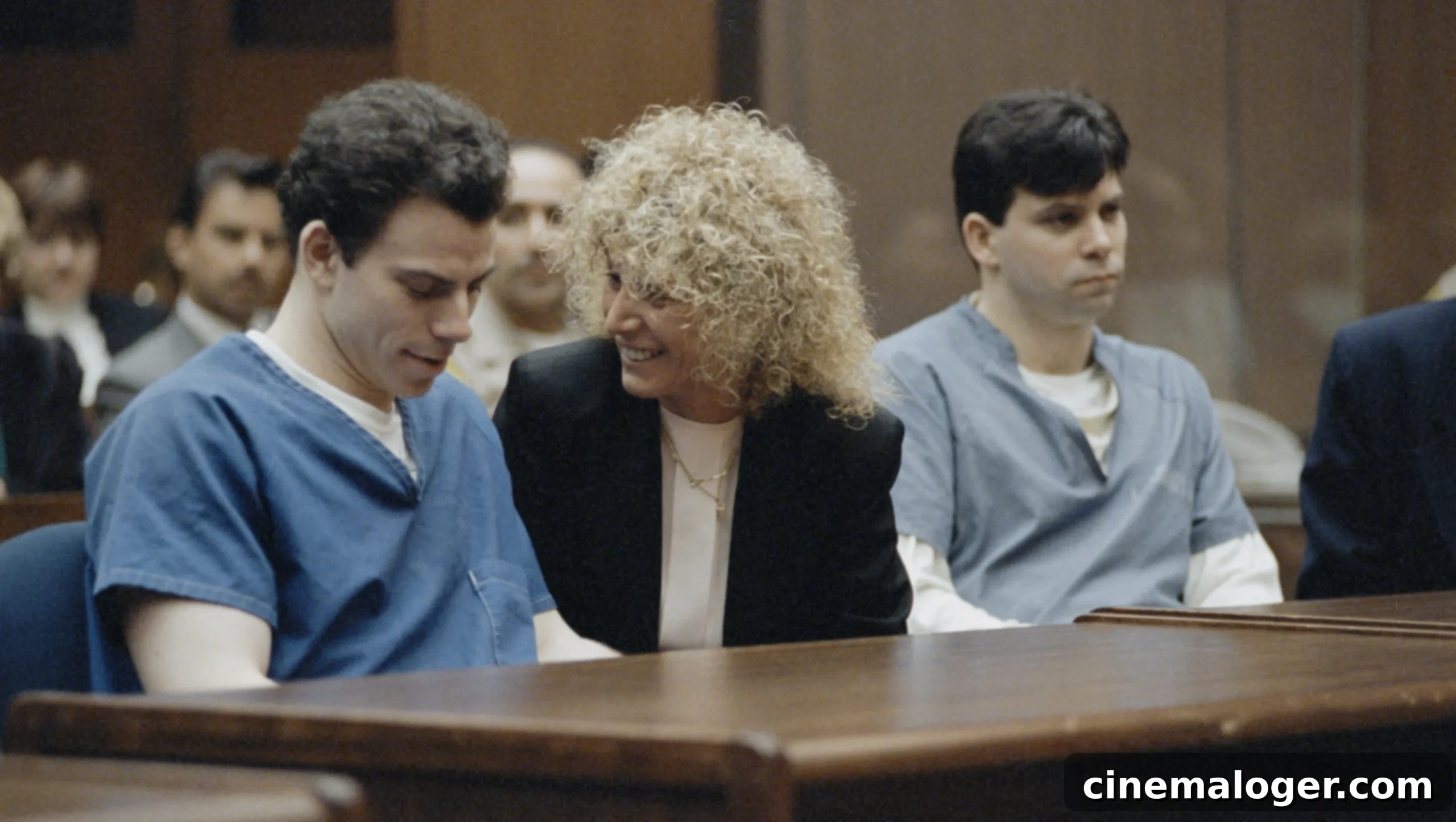Leslie Abramson and the Menendez Brothers: Unraveling Her Post-Trial Contact, Legacy, and Stance on Netflix’s ‘Monsters’
The infamous parricide case involving brothers Lyle and Erik Menendez captivated the nation in the 1990s, propelling their defense attorney, Leslie Abramson, into the national spotlight. Her fierce advocacy and unconventional defense strategy left an indelible mark on legal history and public perception. After a tumultuous journey through two highly publicized trials, which saw one jury deadlocked and another ultimately convicting the brothers of first-degree murder for the slayings of their parents, José and Mary Louise “Kitty” Menendez, as well as conspiracy to commit murder in 1996, many wonder about the enduring connection between the celebrated lawyer and her high-profile clients. Did Leslie Abramson maintain contact with Lyle and Erik Menendez following their conviction, and what are her current thoughts on the renewed public interest sparked by recent true crime adaptations, particularly Netflix’s ‘Monsters’?
The story of Leslie Abramson and the Menendez brothers is one steeped in legal drama, psychological complexities, and societal fascination with true crime. Her passionate defense, centered on claims of severe childhood abuse endured by Lyle and Erik at the hands of their parents, challenged conventional narratives and forced a re-evaluation of justice and culpability. Decades later, as new generations discover the case through documentaries and series, the question of Abramson’s continued involvement or sentiment towards her former clients remains a prominent point of curiosity. This article delves into her post-trial relationship with the brothers, her perspective on the media’s portrayal of the case, and her life beyond the courtroom spotlight.
Who Is Leslie Abramson? A Forceful Voice in the Courtroom
Leslie Abramson emerged as one of the most recognizable and formidable defense attorneys of her era. Born and raised in Queens, New York, she later moved to Los Angeles in the 1960s, pursuing her legal education at UCLA, where she earned her law degree. Known for her tenacious courtroom presence and an unwavering commitment to her clients, Abramson quickly built a reputation as a lawyer who was not afraid to challenge the system, advocate for the marginalized, and present controversial defenses. Her extensive experience, spanning decades, included representing numerous individuals charged with murder, establishing her as a seasoned legal professional.
The Menendez brothers’ case, however, would become her most defining and emotionally taxing endeavor. Following Lyle and Erik’s 1996 conviction, Abramson candidly spoke with The Washington Post, expressing the immense toll the trials had taken on her. She described the first trial as “incredibly stressful” and the second as “monstrous,” signaling a deep personal investment in the outcome. This sentiment underscored her dedication but also hinted at a need for respite from the high-stakes world of capital cases. “Certainly, this will be my last capital case for a while. I need a breather from this. But by the same token, I’m not ready to do nothing,” she remarked, indicating a desire to step back from the intense scrutiny of highly publicized trials without retiring completely.
Abramson’s defense strategy for the Menendez brothers was groundbreaking and highly controversial at the time. She argued that Lyle and Erik were not cold-blooded murderers but rather “troubled kids” who had “cracked” under the immense psychological pressure of years of alleged emotional, physical, and sexual abuse from their parents. This narrative sought to reframe their actions as a desperate response to trauma, a concept that was far from universally accepted in the legal community or by the public. Her quotes from that period reveal her deep conviction in this defense. “I’ve represented people charged with murder for 27 years, and these guys just don’t measure up to anybody else I’ve ever represented,” Leslie asserted, distinguishing the Menendez brothers from other defendants she had encountered. She continued, “These are not murderers. These are troubled kids in a very difficult and grotesque home environment, and they cracked. … It’s a grotesquely disproportionate verdict and punishment for what happened here. When children kill their parents, something is wrong in that family. It’s a different moral mix for a sexual predator, those who kill strangers.” Her arguments, while ultimately unsuccessful in securing an acquittal, brought the issue of childhood abuse into sharp focus and ignited a national conversation about its potential role in extreme acts of violence.

Is Leslie Abramson Still in Contact With the Menendez Brothers? Her Definitive Stance
Despite her unwavering dedication during the trials, it appears that Leslie Abramson did not maintain contact with either Lyle or Erik Menendez following their 1996 conviction. This decision, while perhaps surprising to some given the intense bond often formed between defense attorneys and their clients in such high-stakes cases, is not uncommon once the legal process has concluded and appeals have been exhausted. The brothers were initially sent to separate prisons, a separation that lasted until their highly anticipated reunion in 2018. Since then, they have been incarcerated together at San Diego’s Richard J. Donovan Correctional Facility, a development that sparked renewed public interest in their story.
Abramson’s perspective on her post-trial relationship with the brothers, and indeed on the ongoing media fascination with the case, was made strikingly clear during an encounter with Entertainment Tonight. In a video published by the outlet, a videographer approached her, inquiring about her feelings regarding Lyle and Erik’s upcoming court hearing. Her response was immediate and firm: “I will make no comments about my client. None whatsoever,” she stated emphatically while walking away. This declaration underscored a professional distance she has seemingly maintained, refusing to engage in public discourse about a case that concluded decades ago.
The videographer then pressed further, asking about her thoughts on Netflix’s ‘Monsters,’ the highly anticipated true crime series. Abramson’s reaction was even more pointed, revealing a clear disdain for such productions. “That piece of s**t I heard about? No, I don’t watch any of those,” Leslie retorted, leaving no room for ambiguity regarding her opinion. Her strong language reflects a deep-seated aversion to the sensationalized retelling of traumatic events, particularly those she was intimately involved with. She further emphasized her disinterest in true crime narratives by noting that she also didn’t “watch the last series,” referring to Law & Order True Crime: The Menendez Murders. This consistent refusal to engage with media interpretations of the Menendez case suggests a desire to protect the integrity of her work, the privacy of the individuals involved, and perhaps her own peace of mind, from the often-reductive nature of true crime entertainment.
Where Is Leslie Abramson Now? A Life Beyond the Public Gaze
After the demanding Menendez brothers’ trial, Leslie Abramson continued her distinguished legal career, albeit with a more selective approach to high-profile cases. One notable subsequent client was the renowned music producer Phil Spector, who faced charges of second-degree murder in connection with the 2003 death of actress Lana Clarkson. However, Abramson eventually resigned from the Spector case, which ultimately saw Spector convicted of second-degree murder in 2009. This experience, combined with the intense pressure of the Menendez trials, appears to have solidified her decision to step away from the relentless public scrutiny that accompanies such high-profile legal battles. Since her retirement from the practice of law and the conclusion of the Spector case, Leslie Abramson has largely remained out of the public eye, choosing a life of privacy away from the media’s glare.
Despite her withdrawal from public life, the shadow of the Menendez case occasionally brings her back into headlines, particularly with the resurgence of true crime documentaries. In the lead-up to Netflix’s October 2024 documentary, The Menendez Brothers, Leslie Abramson was approached for an interview. She respectfully declined, adhering to her pattern of non-engagement with such productions. However, she did provide a concise and powerful statement to the documentary team, which offered a rare glimpse into her current perspective on the case and her past work. Her statement read: “30 years is a long time. I’d like to leave the past in the past. No amount of media, nor teenage petitions will alter the fate of these clients. Only the court can do that, and they have ruled.”
This statement encapsulates Abramson’s enduring philosophy regarding the Menendez case. The phrase “30 years is a long time” suggests a desire for closure and an acknowledgment of the passage of time, which has done little to diminish the public’s fascination but has evidently brought her personal detachment. Her wish “to leave the past in the past” is a clear indication that she has moved on and does not wish to revisit the emotional and professional challenges of those years. Perhaps most significantly, her assertion that “No amount of media, nor teenage petitions will alter the fate of these clients. Only the court can do that, and they have ruled,” underscores her firm belief in the finality of the legal system’s decisions. It serves as a subtle rebuke to the ongoing public debate and the various campaigns for the brothers’ release, emphasizing that once a court has rendered its judgment, that is the ultimate authority, not public opinion or media narratives. Her words convey a strong sense of judicial finality and a refusal to participate in what she likely views as futile or sensationalized discussions.
Today, Leslie Abramson lives a quiet life, having carved out a space of privacy that contrasts sharply with her years as a prominent public figure. Her legacy, however, continues to be debated and analyzed within legal circles and among true crime enthusiasts. Her courageous defense of the Menendez brothers, irrespective of the outcome, forever changed the conversation around child abuse as a potential mitigating factor in criminal behavior. While she may prefer to keep the past in the past, her impact on the American legal landscape remains undeniable.
Does Leslie Abramson Have Kids? Protecting Her Private Life
Leslie Abramson is a mother of two children. However, true to her fiercely private nature, especially after the intense public scrutiny surrounding the Menendez trials, she has meticulously kept their names and details about her private life out of the public eye. This commitment to privacy reflects a conscious decision to shield her family from the potentially intrusive and sensationalist elements of being associated with such high-profile legal cases. After decades in the public sphere, often fighting battles that drew immense media attention, Abramson has clearly prioritized her family’s anonymity and personal space, maintaining a clear boundary between her professional life and her personal world.
The Menendez brothers’ case, with its themes of familial dysfunction and tragic outcomes, likely reinforced Abramson’s desire to protect her own family. Her decision to keep her children’s identities and her personal circumstances confidential highlights a common practice among public figures who strive to maintain a semblance of normalcy and protection for their loved ones amidst the glare of celebrity and notoriety. Her private life, therefore, remains largely separate from her public legacy as one of America’s most memorable and controversial defense attorneys.
If you or anyone you know has been sexually abused, call the National Sexual Assault Hotline at 1-800-656-HOPE (4673). A trained staff member will provide confidential, judgment-free support as well as local resources to assist in healing, recovering and more.
